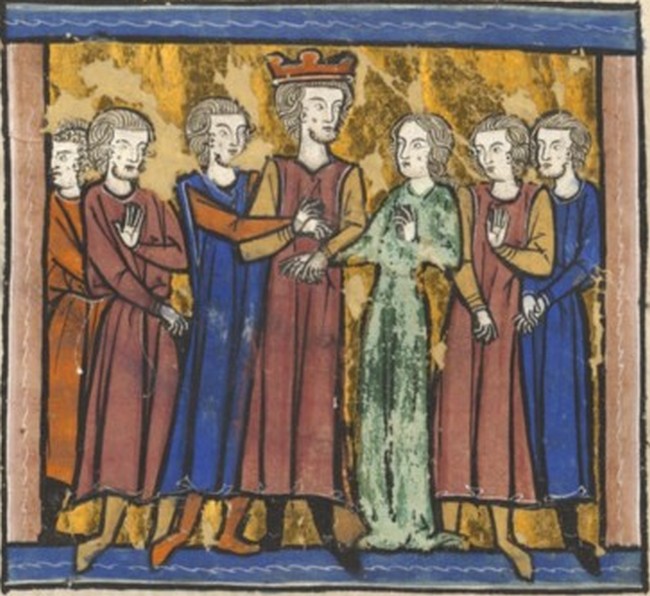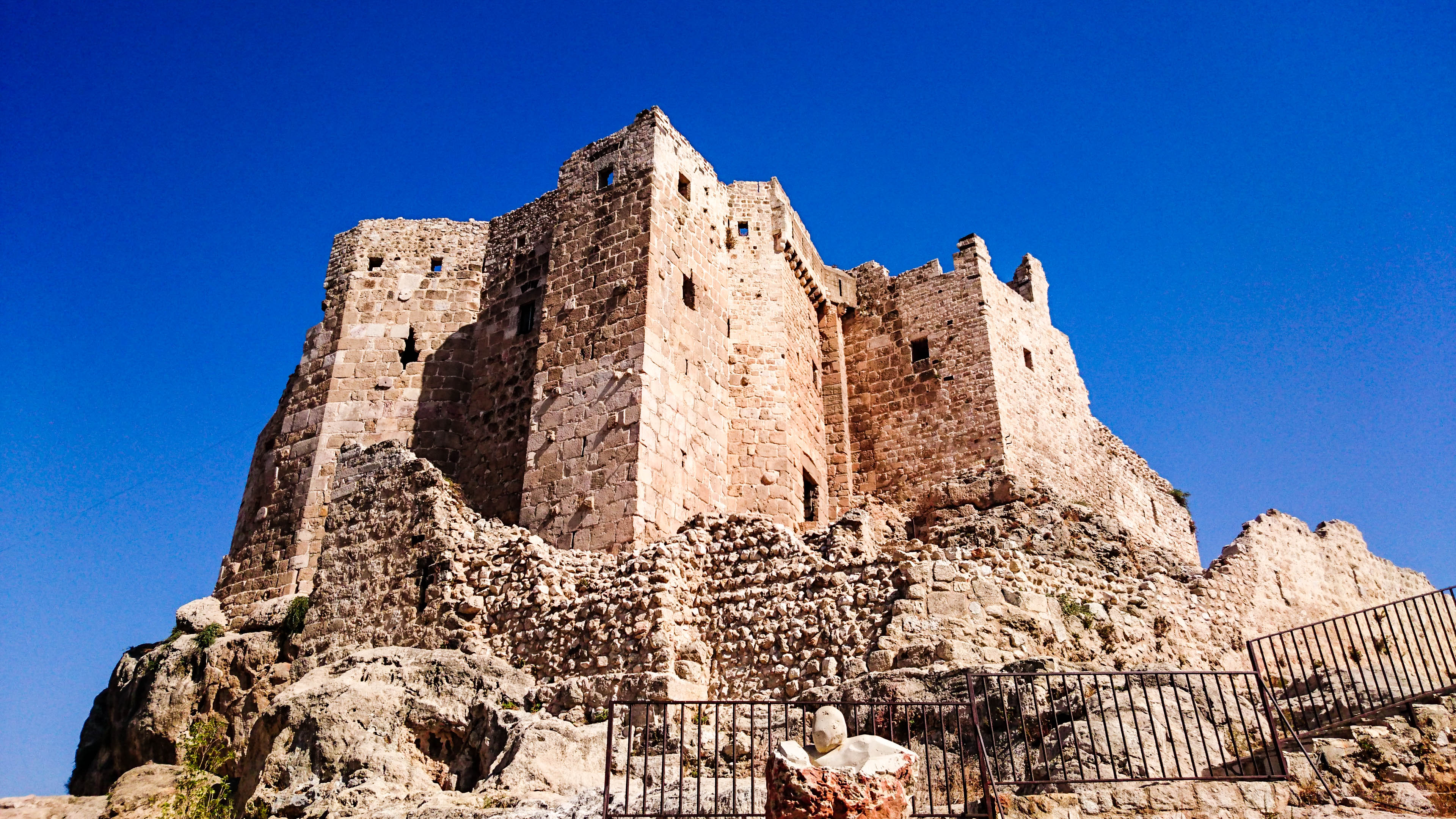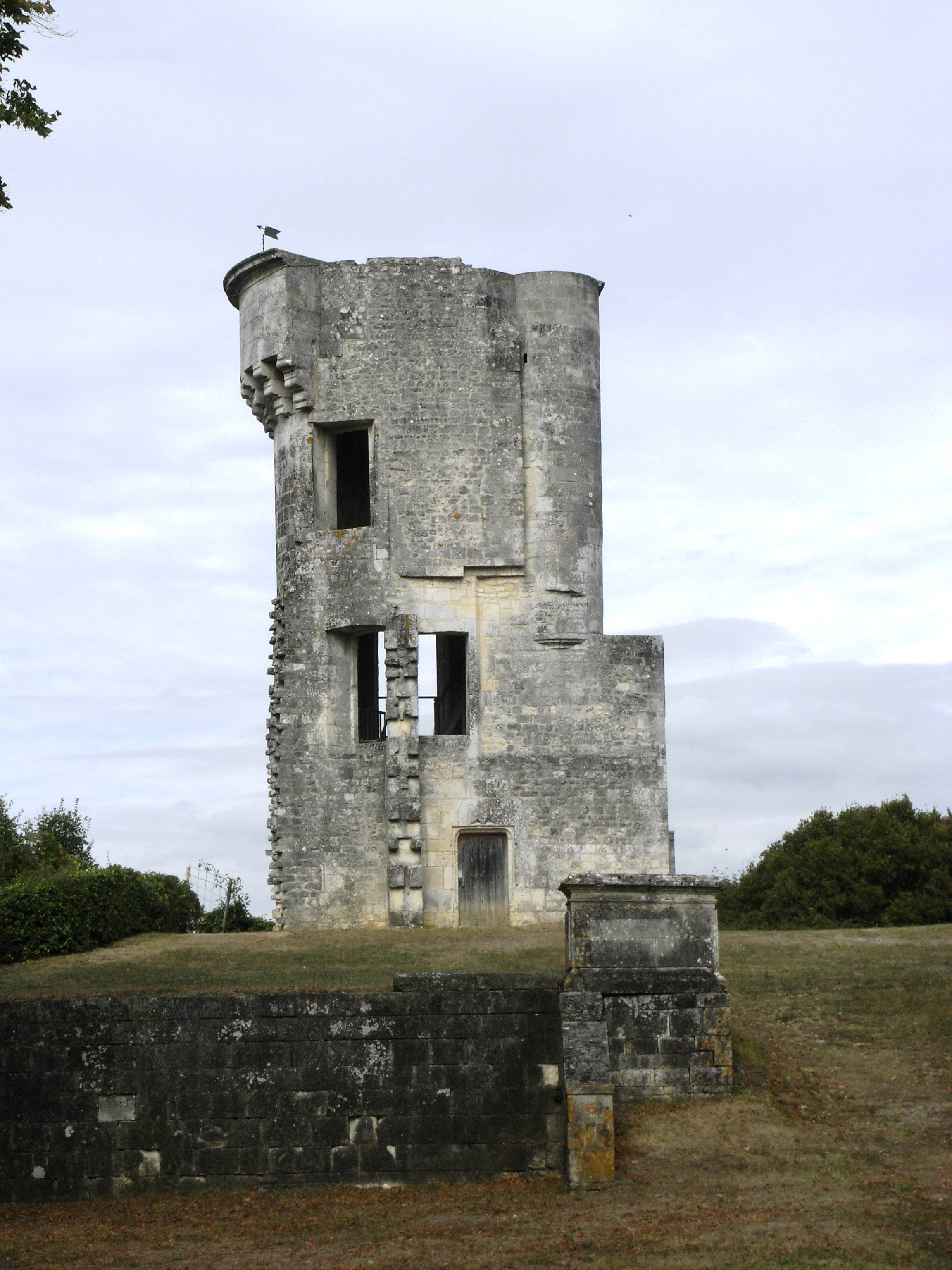|
Guy Of Lusignan
Guy of Lusignan ( 1150 – 18 July 1194) was King of Jerusalem, first as husband and co-ruler of Queen Sibylla from 1186 to 1190 then as disputed ruler from 1190 to 1192. He was also Lord of Cyprus from 1192 to 1194. A French Poitevin knight, Guy was the youngest son of Hugh VIII of Lusignan and the younger brother of Aimery of Lusignan. Having arrived in the Holy Land (where his brother Aimery was already prominent) at an unknown date, Guy was hastily married to Sibylla in 1180 to prevent a political incident within the kingdom. As the health of his brother-in-law Baldwin IV of Jerusalem deteriorated, Sibylla appointed Guy as regent for his stepson, Baldwin V. Baldwin IV died in 1185, followed shortly by Baldwin V in 1186, leading to the succession of Sibylla and Guy to the throne. Guy's reign was marked by increased hostilities with the Ayyubids ruled by Saladin, culminating in the Battle of Hattin in July 1187—during which Guy was captured—and the fall of Jerusa ... [...More Info...] [...Related Items...] OR: [Wikipedia] [Google] [Baidu] |
King Of Jerusalem
The king or queen of Jerusalem was the supreme ruler of the Kingdom of Jerusalem, a Crusader state founded in Jerusalem by the Latin Church, Latin Catholic leaders of the First Crusade, when the city was Siege of Jerusalem (1099), conquered in 1099. Most of them were men, but there were also List of queens of Jerusalem#Queens regnant of Jerusalem, five queens regnant of Jerusalem, either reigning alone ''suo jure'' ("in her own right"), or as coregency, co-rulers of husbands who reigned as kings of Jerusalem ''jure uxoris'' ("by right of his wife"). Godfrey of Bouillon, the first ruler of the Kingdom of Jerusalem, refused the title of king choosing instead the title , that is Advocate or Defender of the Church of the Holy Sepulchre. In 1100 Baldwin I of Jerusalem, Baldwin I, Godfrey's successor, was the first ruler crowned as king. The crusaders in Jerusalem were Siege of Jerusalem (1187), conquered in 1187, but their Kingdom of Jerusalem survived, moving the capital to Acre, Is ... [...More Info...] [...Related Items...] OR: [Wikipedia] [Google] [Baidu] |
Baldwin IV Of Jerusalem
Baldwin IV (1161–1185), known as the Leper King, was the king of Jerusalem from 1174 until his death in 1185. He was admired by historians and his contemporaries for his dedication to the Kingdom of Jerusalem in the face of his debilitating leprosy. Choosing competent advisers, Baldwin ruled a thriving crusader state and succeeded in protecting it from the Muslim ruler Saladin. Baldwin's parents, King Amalric and Agnes of Courtenay, separated when Baldwin was two. At nine years old, he was sent to be educated by Archbishop William of Tyre. William noticed preliminary symptoms of leprosy, but Baldwin was only diagnosed after he succeeded his father as king. Thereafter, his hands and face became increasingly disfigured. He mastered horse riding despite gradually losing sensation in his extremities and fought in battles until his last years. Miles of Plancy ruled the kingdom in Baldwin's name until the former was murdered, and Count Raymond III of Tripoli took over until the kin ... [...More Info...] [...Related Items...] OR: [Wikipedia] [Google] [Baidu] |
Henry II Of England
Henry II () was King of England The monarchy of the United Kingdom, commonly referred to as the British monarchy, is the form of government used by the United Kingdom by which a hereditary monarch reigns as the head of state, with their powers Constitutional monarchy, regula ... from 1154 until his death in 1189. During his reign he controlled Kingdom of England, England, substantial parts of Wales in the High Middle Ages, Wales and Lordship of Ireland, Ireland, and much of Kingdom of France, France (including Duchy of Normandy, Normandy, County of Anjou, Anjou, and Duchy of Aquitaine, Aquitaine), an area that altogether was later called the Angevin Empire, and also held power over Kingdom of Scotland, Scotland and the Duchy of Brittany. Henry was the eldest son of Geoffrey Plantagenet, Count of Anjou, and Empress Matilda, Matilda, daughter of Henry I of England. By the age of fourteen, he became politically and militarily involved in The Anarchy, his mother's efforts ... [...More Info...] [...Related Items...] OR: [Wikipedia] [Google] [Baidu] |
Byzantine Empire
The Byzantine Empire, also known as the Eastern Roman Empire, was the continuation of the Roman Empire centred on Constantinople during late antiquity and the Middle Ages. Having survived History of the Roman Empire, the events that caused the fall of the Western Roman Empire in the 5th centuryAD, it endured until the fall of Constantinople to the Ottoman Empire in 1453. The term 'Byzantine Empire' was coined only after its demise; its citizens used the term 'Roman Empire' and called themselves 'Romans'. During the early centuries of the Roman Empire, the western provinces were Romanization (cultural), Latinised, but the eastern parts kept their Hellenistic culture. Constantine the Great, Constantine I () legalised Christianity and moved the capital to Constantinople. Theodosius I, Theodosius I () made Christianity the state religion and Greek gradually replaced Latin for official use. The empire adopted a defensive strategy and, throughout its remaining history, expe ... [...More Info...] [...Related Items...] OR: [Wikipedia] [Google] [Baidu] |
Order Of Assassins
The Order of Assassins (; ) were a Nizari Isma'ilism, Nizari Isma'ili order that existed between 1090 and 1275 AD, founded by Hasan-i Sabbah, Hasan al-Sabbah. During that time, they lived in the mountains of Persia and the Levant, and held a strict subterfuge policy throughout the Middle East, posing a substantial strategic threat to Fatimid Caliphate, Fatimid, Abbasid, and Seljuk Empire, Seljuk authority, and killing several Christian leaders. Over the course of nearly 200 years, they killed hundreds who were considered enemies of the Nizari Isma'ili state. The modern term assassination is believed to stem from the tactics used by the Assassins. Contemporaneous historians include ibn al-Qalanisi, Ali ibn al-Athir, and Ata-Malik Juvayni. The former two referred to the Assassins as ''batiniyya'', an epithet widely accepted by Isma'ilis themselves. Overview The Assassins were founded by Hassan-i Sabbah. The state was formed in 1090 after the capture of Alamut Castle in the Albo ... [...More Info...] [...Related Items...] OR: [Wikipedia] [Google] [Baidu] |
Richard I Of England
Richard I (8 September 1157 – 6 April 1199), known as Richard the Lionheart or Richard Cœur de Lion () because of his reputation as a great military leader and warrior, was King of England from 1189 until his death in 1199. He also ruled as Duke of Normandy, Duke of Aquitaine, Aquitaine, and Duchy of Gascony, Gascony; Lord of Cyprus in the Middle Ages, Cyprus; Count of Poitiers, Counts and dukes of Anjou, Anjou, Count of Maine, Maine, and Count of Nantes, Nantes; and was overlord of Brittany at various times during the same period. He was the third of five sons of Henry II of England and Eleanor of Aquitaine and was therefore not expected to become king, but his two elder brothers predeceased their father. By the age of 16, Richard had taken command of his own army, putting down rebellions in Poitou against his father. Richard was an important Christian commander during the Third Crusade, leading the campaign after the departure of Philip II of France and achieving sev ... [...More Info...] [...Related Items...] OR: [Wikipedia] [Google] [Baidu] |
Philip II Of France
Philip II (21 August 1165 – 14 July 1223), also known as Philip Augustus (), was King of France from 1180 to 1223. His predecessors had been known as kings of the Franks (Latin: ''rex Francorum''), but from 1190 onward, Philip became the first French monarch to style himself "King of France" (''rex Francie''). The son of King Louis VII and his third wife, Adela of Champagne, he was originally nicknamed () because he was a first son and born late in his father's life. Philip was given the epithet "Augustus" by the chronicler Rigord for having extended the crown lands of France so remarkably. After decades of conflicts with the House of Plantagenet, Philip succeeded in putting an end to the Angevin Empire by defeating a coalition of his rivals at the Battle of Bouvines in 1214. This victory would have a lasting impact on western European politics: the authority of the French king became unchallenged, while John, King of England, was forced by his barons to assent to Magna C ... [...More Info...] [...Related Items...] OR: [Wikipedia] [Google] [Baidu] |
Third Crusade
The Third Crusade (1189–1192) was an attempt led by King Philip II of France, King Richard I of England and Emperor Frederick Barbarossa to reconquer the Holy Land following the capture of Jerusalem by the Ayyubid sultan Saladin in 1187. For this reason, the Third Crusade is also known as the Kings' Crusade. It was partially successful, recapturing the important cities of Acre and Jaffa, and reversing most of Saladin's conquests, but it failed to recapture Jerusalem, which was the major aim of the Crusade and its religious focus. After the failure of the Second Crusade of 1147–1149, the Zengid dynasty controlled a unified Syria and engaged in a conflict with the Fatimid rulers of Egypt. Saladin ultimately brought both the Egyptian and Syrian forces under his own control, and employed them to reduce the Crusader states and to recapture Jerusalem in 1187. Spurred by religious zeal, King Henry II of England and King Philip II of France (later known as "Philip Augustus") e ... [...More Info...] [...Related Items...] OR: [Wikipedia] [Google] [Baidu] |
Siege Of Acre (1189–1191)
The siege of Acre was the first significant counterattack by Guy of Lusignan, Guy of Jerusalem against Saladin, leader of the Muslims in Ayyubid dynasty, Syria and Egypt. This pivotal siege formed part of what later became known as the Third Crusade. The siege lasted from August 1189 until July 1191, at which time the city's coastal position meant the attacking Latin forces were unable to fully capture the city and Saladin was unable to fully relieve it, with both sides receiving supplies and resources by sea. It concluded as a key victory for the Crusaders and a serious setback for Saladin's ambition to destroy the Crusader states. Background Egypt was ruled by the Shia Islam, Shi'ite Fatimid Caliphate, Fatimid dynasty from 969, independent from the Sunni Islam, Sunni Abbasid Caliphate, Abbasid rulers in Baghdad and with a rival Shi'ite caliph—that is ''successor'' to the Muslim prophet Muhammad. Governance fell to the caliph's chief administrator called the vizier. Fro ... [...More Info...] [...Related Items...] OR: [Wikipedia] [Google] [Baidu] |
Tyre, Lebanon
Tyre (; ; ; ; ) is a city in Lebanon, and one of the List of oldest continuously inhabited cities, oldest continuously inhabited cities in the world. It was one of the earliest Phoenician metropolises and the legendary birthplace of Europa (consort of Zeus), Europa, her brothers Cadmus and Phoenix (son of Agenor), Phoenix, and Carthage's founder Dido (Elissa). The city has many ancient sites, including the Tyre Hippodrome, and was added as a whole to the list of UNESCO World Heritage Sites in 1984. The historian Ernest Renan noted that "One can call Tyre a city of ruins, built out of ruins". Tyre is the fifth-largest city in Lebanon after Beirut, Tripoli, Lebanon, Tripoli, Sidon, and Baalbek. It is the capital of the Tyre District in the South Governorate. There were approximately 200,000 inhabitants in the Tyre urban area in 2016, including many refugees, as the city hosts three of the twelve Palestinian refugee camps in Lebanon: Burj el-Shamali, Burj El Shimali, El-Buss refugee ... [...More Info...] [...Related Items...] OR: [Wikipedia] [Google] [Baidu] |
Damascus
Damascus ( , ; ) is the capital and List of largest cities in the Levant region by population, largest city of Syria. It is the oldest capital in the world and, according to some, the fourth Holiest sites in Islam, holiest city in Islam. Known colloquially in Syria as () and dubbed, poetically, the "City of Jasmine" ( ), Damascus is a major cultural center of the Levant and the Arab world. Situated in southwestern Syria, Damascus is the center of a large metropolitan area. Nestled among the eastern foothills of the Anti-Lebanon mountain range inland from the eastern shore of the Mediterranean on a plateau above sea level, Damascus experiences an arid climate because of the rain shadow effect. The Barada, Barada River flows through Damascus. Damascus is one of the List of oldest continuously inhabited cities, oldest continuously inhabited cities in the world. First settled in the 3rd millennium BC, it was chosen as the capital of the Umayyad Caliphate from 661 to 750. Afte ... [...More Info...] [...Related Items...] OR: [Wikipedia] [Google] [Baidu] |
Siege Of Jerusalem (1187)
The siege of Jerusalem lasted from 20 September to 2 October 1187, when Balian of Ibelin surrendered the city to Saladin. Earlier that summer, Saladin had defeated the kingdom's army and conquered several cities. Balian was charged with organizing a defense. The city was full of refugees but had few soldiers. Despite this fact the defenders managed to repulse several attempts by Saladin's army to take the city by storm. Balian bargained with Saladin to buy safe passage for many, and the city was peacefully surrendered with limited bloodshed. Though Jerusalem fell, it was not the end of the Kingdom of Jerusalem, as the capital shifted first to Tyre and later to Acre after the Third Crusade. Latin Christians responded in 1189 by launching the Third Crusade led by Richard the Lionheart, Philip Augustus, and Frederick Barbarossa separately. In Jerusalem, Saladin restored Muslim holy sites and generally showed tolerance towards Christians; he allowed Orthodox and Eastern Christia ... [...More Info...] [...Related Items...] OR: [Wikipedia] [Google] [Baidu] |











